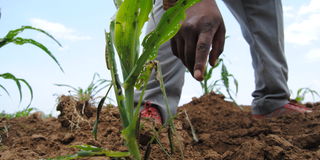Looming famine as armyworms spread to 33 counties

A farmer shows part of the maize crop destroyed by the fall armyworm at a farm in Duka Moja,Narok East sub-county in March, 2022.
Kenya is staring at a food crisis with the ongoing infestation of the African armyworm. Cereal crops and fodder are likely to fail in about 33 counties because of the pests.
Some 500,000 acres of land have been affected by the destructive pests, says the Department of Crops Development and Research.
Most farmers started seeing the pests as early as February, said Dr Francis Owino, the principal secretary in the state department for Crop Development and Agricultural Research.
“We have not done an assessment of the scope of the loss and impact. During the visit in Busia, which was adversely affected, I did direct an assessment to be done,” Dr Owino said.
The African armyworm is one of the three plant pests in Kenya that pose a great threat to food and nutrition security, alongside desert locusts and quelea birds.
“The current African armyworm outbreak in six regions of the country, therefore, just compounds the existing challenge of migratory pests,” he said.
He spoke on Tuesday in Mombasa during the launch of training on controlling armyworms.
The African armyworm is a transnational migratory pest of economic significance due to its high reproductive capacity, rapid development, high mobility and intensive feeding habit.
Failure to contain the pests or delays in tackling them can potentially lead to 100 percent crop and pasture loss.
In 2006, more than 1.5 million acres of pasture and 75,950 acres under cereal crops were infested by armyworms.
“Out of these, 23,030 acres under cereals were effectively controlled and the crop with a monetary value of approximately Sh235 million salvaged,” Dr Owino noted.
The current armyworm outbreak comes at a critical period when Kenya is in the March-April main maize planting season, which records the highest production of the crop.
Now the national government, in partnership with the Food and Agriculture Organization (FAO), has started training agriculture officers in the affected counties on how to contain the pests.
“The ministry has trained youth across the counties as spray service providers to spray pesticides for the farmers,” Dr Owino said.
FAO agricultural entomologist Dr George Ong’amo said emergency response to the African armyworm outbreak is necessary in order to avert a food and nutrition crisis in Kenya.
The training includes how to maintain personal safety for the spray providers, other humans, livestock, the environment and other forms of life, as well as responsible use of pesticides for maximum effectiveness.
A farmer checks the extent of damage on his maize plantation caused by fall armyworms.
“We felt we should begin with capacity building to empower the agriculture officers to handle the crisis we are facing,” Dr Ong’amo said.
In North Rift, the country’s bread basket, cereal farmers are staring at poor harvests due to repeated outbreaks of fall armyworms, threatening farm yields already affected by higher production costs this season.
National disaster
The destructive pests have been reported in several counties in the region, with agricultural experts warning that they will become a national disaster unless quick interventions are made.
In Uasin Gishu County, the pest has been reported in parts of Kapseret and Soy, according to the county department of agriculture.
Agriculture executive Samuel Yego said his department was monitoring the pests to come up with mitigation measures.
“We are encouraging farmers to report so that we can assist them get agro-chemicals to control it. We believe that the rains will suppress [the pests],” said Mr Yego.
The armyworms found their way to parts of Nandi, Uasin Gishu and Trans Nzoia counties from Nyanza and Vihiga due to climate change. Farmers are encouraged to spray their farms with chemicals, which they claim are costly.
In Trans Nzoia, the pests have been spotted on several farms, with the agriculture department deploying surveillance and monitoring teams to spray chemicals to cushion farmers against losses.
“[The armyworms have] destroyed maize and other crops in several parts of the county. The first case was reported on March 3, 2022, mainly on pasture,” said Agriculture executive Mary Nzomo.
She asked farmers to spray the pests with the right chemicals, noting that her department was distributing pesticides to the affected farmers.

A farmer shows a maize crop completely destroyed by the fall armyworm at a farm in Duka Moja,Narok East sub-county in March, 2022.
“We shall make sure our food production is not interfered with by these pests. Our initiative is to control both pre and post-harvest losses,” she added.
Armyworms have destroyed 500,000 acres of land under pasture and crops in 33 counties, said Francis Owino, the principal secretary in the State Department for Crops Development and Agriculture Research.
He said the Ministry of Agriculture, in collaboration with the Food and Agriculture Organization (FAO), was training crop officers to control the spread of the pests.
Agriculture Cabinet Secretary Peter Munya last week said his ministry had set up a crop production unit to coordinate mitigation measures against pests like the fall armyworm.
Irrigation schemes
In Turkana, maize farmers in irrigation schemes that rely on the permanent Turkwel River in Turkwel ward, Loima sub-county, and in Katilu, Turkana South, are staring at huge losses following the armyworm invasion.
Despite the efforts of PanAfricare, with support from the Bayer Fund, to repair canals that direct water to the farms from the river, ploughing with tractors and expanding farms by clearing thorny prosopis juliflora, maize plantations in the Nadapal, Nakol, Natuntun and Napak irrigation schemes have been invaded by the pests.
The maize in the affected plantations are at different stages of growth, said Lucia Epur, a PanAfricare agriculture and natural resources specialist.
"At least 10 acres on each of the largest schemes like Kang'erega, Napak and Nadapal, which locals were to rely on for maize especially during this drought period, have the pests, which have caused extensive defoliation, leaving only the ribs and stalks of maize plants," Ms Epur said.

African Armyworms invade farms in Murang'a County on April 11, 2022.
Turkwel ward agriculture outreach agent Jonnes Lopeyok said the pests affected maize plantations since 2017, resulting in low yields.
"We have never found a reliable pesticide to control the pests that have continued to reverse anticipated gains from investment in irrigation as a solution to food insecurity in the county," Mr Lopeyok said.
Farmer Ekutan Lokupe said his farm relies on the Turkwel River for water but the pests invade every time he plants maize.
"At the moment, my maize plantation is greener and attractive, especially now that most parts of the county are dry due to drought. But I will not be able to harvest a sack of maize because the pests have invaded the whole farm," he said.
Armyworms, he said, have developed resistance to their homemade pesticides, which they make from a solution of neem tree leaves, tobacco and soap powder.
Armyworm moths can migrate long distances, flying about 30 kilometres a day, especially in the evening.
Country’s bread basket
Trans Nzoia County allocated Sh45 million last season to fight the pests, which could wipe out more than 500 hectares of maize plantations in the country’s bread basket.
“We have offered logistics to our agricultural field extension officers to sensitise farmers on how to identify the pests and spray with the right chemicals to contain the spread,” Robert Kosgei, an agricultural expert in the region.
He said the larvae or caterpillars cause severe damage to more than 80 plant species, including maize, sorghum, rice, millet, wheat and barley.
The worms also attack fodder, including Bermuda grass and napier, as well as sugarcane and cotton.
Other susceptible crops include kales, cabbages, legumes, pulses, bananas, tomatoes, capsicum, ginger, spinach, amaranthus, onions, sugar beet, citrus, cucumber and sunflower.
Farmers in Kiminini and Saboti sub-counties in Trans Nzoia have lamented the armyworm invasion.
Eunice Koskei, a maize farmer in the Kibagenge area of Kiminini who has planted the crop on 10 acres and Bomarod grass on two acres, said the pests came in big numbers.
She described the worms as tiny black insects that grow quickly and wipe out plants within a short time.
"I have seen my neighbours report the infestation in our WhatsApp group, which indicates that the invasion is on a bigger scale and I am worried that this could spread to my crops and cause more harm," she said.
Oscar Misiko, another farmer in Bishop Muge, Waitaluk ward, discovered the worms on his farm two weeks ago. They have spread to his pastureland.
Mr Misiko, who has 43 acres under diverse crops and dairy cows, urged the government to intervene.
The county department of agriculture, however, says the invasion has slowed down owing to the current rains falling in the region.

Crops eaten up by armyworms in a Busia farm.
The county received 3,266 litres of insecticides to fight the worms.
"We are prepared with chemicals that have already been dispatched to sub-counties. We are on high alert. Today, we dispatched a batch of insecticides to fight the worm after farmers raised concern over its infestation around the county," said Ms Nzomo, the Trans Nzoia Agriculture executive.
She said the chemicals had four components and were effective in controlling the pests.
For small-scale farmers, Ms Nzomo said, farmers can use a variant of the insecticides that is mixed with water and sprayed using knapsack sprayers.
Another variant
But for large-scale farmers, she added, there is another variant that has a special fumigation machine.
She said a technical team will be dispatched to train farmers on how to use the insecticides. Meetings will also be scheduled with provincial administrators, including chiefs and their assistants, to organise farmer sensitisation workshops on how well to tackle the worms.
"The African armyworms are so deadly because they feed on the entire crop and are active both during the day and in the night. But we are in control and have taken the necessary steps to control them from spreading any further," she said.
The Ministry of Agriculture recommends a broad spectrum of pesticides, with the cheapest costing Sh20,000 a litre. And that is enough for only one acre.
“This spells doom for us when coupled with the high cost of farm inputs, the drought in some parts of the region and the unstable maize market,” said Mr Andrew Rotich, a farmer in Cherangany, Trans Nzoia.
In Nandi, the worms have destroyed about 1,200 hectares of young maize farms in Tindiret, Mosop and Aldai sub-counties.
Nandi County Director of Agriculture Simeon Mutai said the worms attacked when farmers started planting maize last month before the onset of the rains.
"The Nandi County government raised concerns about the worm with the national government when the first case was reported in March 2022,” he said.
He revealed that the Ministry of Agriculture supplied the county with chemicals, which were distributed to about 1,500 maize farmers whose maize plantations had been attacked.
Farmers in the three sub-counties were the most affected because they normally start planting earlier than the rest due to varying climatic conditions.
“The African type of armyworms are different from the fall armyworms. This type normally eats young green maize alone,” Mr Mutai explained.
The caterpillars are reported to have previously destroyed thousands of hectares of food crops in Malawi, Zimbabwe, Ghana and Zambia.
In Kenya they found their way from Ghana and South Africa due to climate change.
Farmers are encouraged to spray their farms with chemicals, which they claim are costly.
By Elizabeth Ojina, Barnabas Bii, Stanley Kimuge, Sammy Lutta, Gerald Bwisa and Tom Matoke





